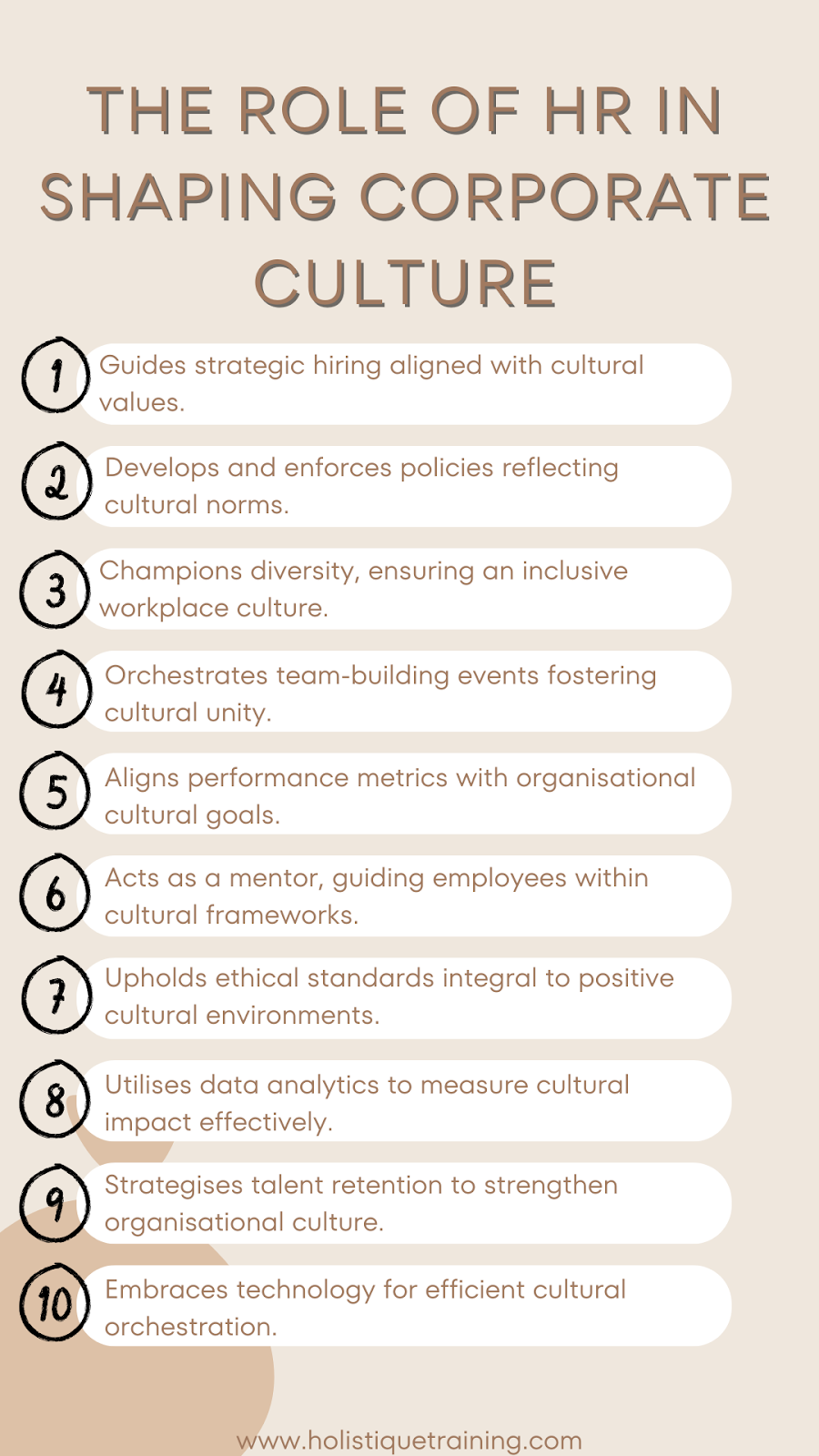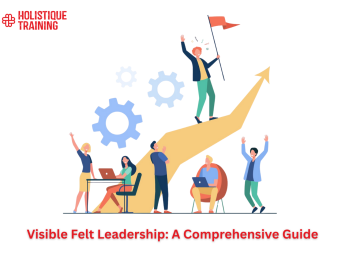- Table of Contents
- Introduction
- What Is Corporate Culture?
- Why Is Having an HR Department Important in Corporate Culture?
- Talent Acquisition and Onboarding
- Policy Development and Implementation
- Employee Engagement
- Performance Management
- Learning and Development
- The Role of HR in Shaping Corporate Culture
- 1- Cultural Ambassador
- 2- Change Agent
- 3- Conflict Resolution Expert
- 4- Custodian of Diversity and Inclusion
- 5- Cultural Architect
- 6- Performance Culture Advocate
- 7- Mentor and Coach
- 8- Guardian of Ethics
- 9- Cultural Metrics Analyst
- 10- Talent Retention Strategist
- The Challenges HR Faces in Shaping a Positive Corporate Culture
- Resistance to Change
- Cultural Alignment Across Locations
- Balancing Tradition and Innovation
- Handling Diversity Dynamics
- Measuring Intangible Elements
- Leadership Buy-In and Role Modelling
- Employee Involvement and Ownership
- Adapting to Remote Work Realities
- Evolution in Organisational Size
- Aligning with External Perceptions
- How Is Technology Facilitating HR’s Role in Corporate Culture?
- Digital Onboarding Platforms
- Collaborative Platforms
- Data Analytics for Culture Measurement
- Learning Management Systems (LMS)
- Employee Recognition Software
- Virtual Team-Building Initiatives
- Employee Feedback Platforms
- Automation of Routine Tasks
- AI-Powered Recruitment Tools
- Digital Wellness Programs
- Conclusion
Introduction
Corporate culture is the symphony that resonates through the halls of every organisation, influencing how employees interact, work, and innovate. It's the invisible force that shapes an organisation's identity and defines its values, beliefs, and behaviours. In this intricate dance of values and norms, the HR department emerges as the conductor, orchestrating the various elements that contribute to the harmonious melody of corporate culture.
What Is Corporate Culture?
Corporate culture is the collective personality of an organisation. It encompasses the shared values, beliefs, practices, and attitudes that define how individuals within the organisation interact with each other and with external stakeholders. It is the bedrock upon which an organisation's identity is built, influencing everything from employee engagement to decision-making processes.
Why Is Having an HR Department Important in Corporate Culture?
In the grand tapestry of corporate culture, the HR department holds a pivotal role. While other departments focus on the day-to-day operations and strategic goals, HR is the guardian of the intangible essence that makes up the culture. Here are some reasons why HR is indispensable in shaping corporate culture:
Talent Acquisition and Onboarding
At the heart of a thriving corporate culture lies the people who embody its values. HR is the gatekeeper, the guardian of cultural fit. In the intricate ballet of talent acquisition, HR professionals don the hat of cultural curators, strategically selecting individuals not merely based on skill sets but on their resonance with the organisation's values. Through meticulous onboarding processes, HR ensures that new recruits seamlessly integrate into the cultural symphony, setting the stage for a harmonious work environment.
Policy Development and Implementation
While policies may seem like bureaucratic red tape to some, HR views them as the silent architects of an organisation's identity. Policies, when crafted with cultural foresight, become the invisible threads that weave through the fabric of daily operations. HR takes on the responsibility of developing and implementing policies that not only comply with legal standards but also echo the organisation's cultural heartbeat. From codes of conduct to diversity and inclusion initiatives, HR lays down the guidelines that govern employee behaviour, ensuring it aligns with the cultural tapestry.
Employee Engagement
In the hustle and bustle of daily tasks, it's easy for employees to lose sight of the bigger picture— the organisational culture. HR steps in as the cultural orchestrator, designing and implementing initiatives that transcend the routine. From team-building exercises to employee recognition programs, HR creates a space where employees feel not just like cogs in a machine but integral parts of a cultural narrative. Thisengagement is the heartbeat of a positive corporate culture, fostering a sense of belonging, motivation, and commitment among employees.
Performance Management
Performance management is more than just a system for evaluating individual contributions; it's a mirror reflecting the organisation's cultural priorities. HR designs performance management systems that align with the organisation's overarching cultural goals. By intertwining performance metrics with cultural values, HR ensures that every employee understands the role they play in advancing the cultural narrative. It's not just about achieving targets; it's about doing so in a manner that resonates with the organisation's identity.
Learning and Development
A culture that stands still is a culture that withers. HR recognises the importance of continuous learning as a catalyst for cultural evolution. Through strategic learning and development initiatives, HR equips employees with the skills and knowledge needed not only to perform their tasks but to contribute meaningfully to the cultural landscape. These initiatives are the stepping stones that lead employees on a journey of growth within the context of the organisation's cultural ethos.
In essence, the HR department is the weaver of the invisible threads that bind an organisation together. It is the architect, the diplomat, and the custodian of the cultural legacy that defines the workplace. As organisations navigate the ever-changing landscape of business, it is the HR department that ensures the cultural compass remains true. It is not merely a department; it is the cultural guardian, standing at the intersection of people and values, shaping the narrative that defines the soul of the organisation.
Table 1: Key Performance Indicators (KPIs) of HR Shaping Corporate Culture
Key Performance Indicator (KPI) | Description | Measurement Approach |
Employee Engagement Index | Fosters a sense of belonging and motivation. | Surveys, feedback, and participation. |
Cultural Alignment in Recruitment | Ensures new hires align with cultural values. | Cultural fit assessments and onboarding. |
Performance-Culture Integration | Links performance metrics to organisational culture. | Evaluation of performance against cultural goals. |
Diversity and Inclusion Impact | Measures the effectiveness of diversity initiatives. | Diversity metrics, inclusion surveys, and feedback. |
Technology Adoption for Culture | Gauges the impact of technology on cultural initiatives. | Analytics on technology-driven cultural programs. |
The Role of HR in Shaping Corporate Culture
1- Cultural Ambassador
HR serves as the living embodiment of the organisation's culture. Through effective communication, interpersonal skills, and personal example, HR professionals become the torchbearers of the cultural torch. They ensure that the organisation's cultural values are not confined to handbooks but are lived and breathed by every employee. This role involves creating a tangible connection between employees and the abstract concept of organisational culture.
2- Change Agent
In an ever-evolving business landscape, change is the only constant. HR assumes the role of a change agent, steering the organisation through transitions while preserving its cultural identity. Whether it's a technological shift or a structural reorganisation, HR ensures that the cultural fabric remains intact, adapting to change without compromising the core values that define the organisation.
3- Conflict Resolution Expert
Conflicts are an inevitable part of any workplace, but HR plays a crucial role in resolving disputes in a manner that aligns with the organisation's cultural values. By fostering open communication and understanding, HR ensures that conflicts are not detrimental to cultural harmony. This role requires a delicate balance between addressing issues and preserving the positive aspects of the organisational culture.
4- Custodian of Diversity and Inclusion
HR champions diversity and inclusion as integral components of a vibrant organisational culture. Through inclusive hiring practices, training programs, and initiatives that celebrate diversity, HR ensures that the workplace reflects a mosaic of backgrounds, perspectives, and experiences. This role involves creating an environment where every employee feels valued and contributes to the richness of the cultural tapestry.
5- Cultural Architect
HR designs and shapes programs that reinforce the desired cultural traits. This includes organising team-building events, recognition programs, and employee wellness initiatives that align with the organisation's cultural goals. The role of a cultural architect involves creating an environment where employees feel not only professionally fulfilled but also emotionally connected to the organisational culture.
6- Performance Culture Advocate
HR establishes and advocates for a performance-driven culture. This involves aligning individual and team goals with the organisation's overarching cultural objectives. Through effective performance management, HR ensures that employees not only meet targets but do so in a manner that reinforces and amplifies the cultural narrative.

7- Mentor and Coach
As mentors and coaches, HR professionals guide employees on their professional journey within the context of the organisational culture. This involves providing support, constructive feedback, and developmental opportunities that contribute to individual growth while reinforcing cultural norms. The mentorship role extends beyond professional development to encompass the holistic well-being of employees within the cultural framework.
8- Guardian of Ethics
Upholding ethical standards is fundamental to a positive corporate culture. HR establishes and enforces ethical guidelines, ensuring that employees conduct themselves in a manner consistent with the organisation's values. This role becomes increasingly crucial in a globalised business environment where ethical considerations may vary across cultural contexts.
9- Cultural Metrics Analyst
In the age of data-driven decision-making, HR leverages analytics to measure the effectiveness of cultural initiatives. Through sentiment analysis, employee surveys, and performance analytics, HR gains insights into the cultural dynamics of the organisation. This role involves translating qualitative aspects of culture into measurable metrics to assess the impact on employee satisfaction, engagement, and overall organisational success.
10- Talent Retention Strategist
Retaining top talent is directly linked to the strength of an organisation's culture. HR develops strategies to retain key employees by creating an environment where individuals feel valued, challenged, and connected to the organisation's cultural identity. This role involves understanding the unique motivations of employees and aligning them with the cultural narrative to foster long-term commitment and loyalty.
In essence, HR is the conductor orchestrating the symphony of organisational culture. These roles collectively contribute to a dynamic and harmonious cultural environment, ensuring that the organisation not only defines its values but lives them every day. HR's impact is not confined to policies and procedures but extends to the very essence of what makes an organisation a unique and thriving ecosystem.
The Challenges HR Faces in Shaping a Positive Corporate Culture
While HR plays a critical role in shaping corporate culture, it is not without its challenges. Some common obstacles include:
Resistance to Change
Change is often met with resistance, and this holds true for cultural shifts within an organisation. Employees may be accustomed to established norms, and any attempt to alter these can lead to scepticism and pushback. HR faces the challenge of overcoming this resistance by implementing effective change management strategies. Clear communication, involving employees in the process, and showcasing the benefits of cultural evolution are vital components in mitigating resistance.
Cultural Alignment Across Locations
For organisations with a global presence, maintaining a consistent corporate culture across different geographical locations poses a significant challenge. Cultural nuances, local customs, and varying work practices need to be considered. HR must strike a balance between fostering a uniform corporate culture and respecting the diversity of regional contexts. This challenge requires a nuanced approach to ensure that the core values resonate universally while allowing for cultural adaptability.
Balancing Tradition and Innovation
Striking a balance between preserving traditional values and embracing innovation is a delicate challenge for HR. While a steadfast commitment to core values is essential, organisations must also evolve to stay competitive. HR professionals must navigate this delicate equilibrium, ensuring that cultural evolution aligns with strategic goals without compromising the foundational principles that define the organisation.
Handling Diversity Dynamics
In today's multicultural workplaces, diversity is a strength, but it also introduces challenges. HR faces the task of creating an inclusive culture that respects and celebrates differences in backgrounds, perspectives, and work styles. This requires proactive measures such as inclusive hiring practices, diversity training, and fostering a culture of belonging where every employee feels valued.
Measuring Intangible Elements
The intangible nature of culture makes it challenging to measure and quantify. HR grapples with finding meaningful metrics that gauge the impact of cultural initiatives on employee satisfaction, engagement, and overall organisational success. Traditional performance metrics may fall short in capturing the essence of cultural dynamics, demanding innovative approaches to measure the immeasurable.
Leadership Buy-In and Role Modelling
The commitment of organisational leaders is pivotal in shaping a positive culture. HR faces the challenge of securing buy-in from top-level executives and ensuring they actively embody the desired cultural traits. If leadership does not authentically embrace and model the cultural values, it becomes challenging to instil them throughout the organisation.
Employee Involvement and Ownership
Cultivating a positive culture is not a top-down endeavour but requires active participation and ownership from employees at all levels. HR must overcome the challenge of engaging employees in the cultural journey. This involves fostering a sense of ownership, creating opportunities for feedback, and empowering employees to contribute to the cultural narrative.
Adapting to Remote Work Realities
The rise of remote work introduces a new dimension to cultural challenges. HR must adapt strategies to maintain and strengthen cultural ties among dispersed teams. Nurturing a sense of connection, fostering open communication in virtual environments, and leveraging technology for virtual team-building become critical in overcoming this challenge.
Evolution in Organisational Size
As organisations grow, maintaining a cohesive culture becomes increasingly challenging. HR faces the task of preserving the cultural essence that defined the organisation in its early stages while adapting to the complexities that come with size and scale. Strategies for cultural alignment must evolve to accommodate the changing dynamics of a larger workforce.
Aligning with External Perceptions
The external perception of an organisation's culture, whether by clients, partners, or the public, can impact its brand and attractiveness. HR faces the challenge of aligning internal cultural efforts with external perceptions, ensuring that the organisation's values are authentically reflected in its public image.
Successfully addressing these challenges requires HR professionals to be agile, proactive, and attuned to the dynamic nature of organisational culture. It involves not only overcoming obstacles but leveraging them as opportunities for growth and continuous improvement. By navigating these challenges, HR becomes a transformative force, shaping a positive corporate culture that fosters employee well-being, innovation, and sustained organisational success.
How Is Technology Facilitating HR’s Role in Corporate Culture?
In the digital age, technology has become a powerful ally in HR's quest to shape and reinforce corporate culture. Here's how technology is transforming HR's role:
Digital Onboarding Platforms
Technology has revolutionised the onboarding process, making it more efficient, engaging, and aligned with the organisational culture. Digital onboarding platforms provide new hires with a seamless introduction to the company's values, mission, and cultural expectations. Interactive content, virtual tours, and multimedia resources create a personalised and immersive experience, setting the tone for a cultural integration from day one.
Collaborative Platforms
The advent of collaborative tools and platforms has broken down geographical barriers, fostering communication and collaboration among employees regardless of their location. Internal social networks, project management tools, and instant messaging platforms facilitate real-time interactions, enabling employees to connect, share ideas, and collaborate. This interconnectedness contributes to a sense of unity and connectivity, enhancing the overall cultural experience.
Data Analytics for Culture Measurement
Advanced data analytics tools empower HR professionals to measure and analyse cultural metrics effectively. By leveraging sentiment analysis, employee surveys, and performance analytics, HR gains valuable insights into the organisation's cultural dynamics. This data-driven approach allows HR to identify areas for improvement, track the impact of cultural initiatives, and make informed decisions to strengthen cultural alignment.
Learning Management Systems (LMS)
Learning Management Systems have become integral to HR's efforts in fostering continuous learning within the organisation. HR can utilise LMS platforms to deliver targeted training programs that align with the organisation's cultural goals. These systems offer a centralised hub for employees to access learning resources, ensuring that professional development aligns with the evolving cultural narrative.
Employee Recognition Software
Technology-driven employee recognition programs provide a systematic and transparent approach to acknowledging and rewarding positive contributions. HR can use recognition software to highlight behaviours and achievements that align with the organisation's cultural values. This not only reinforces the desired cultural traits but also creates a culture of appreciation and motivation.
Virtual Team-Building Initiatives
The rise of remote work has prompted HR to explore virtual team-building initiatives. Technology facilitates virtual team-building activities, workshops, and events that bring employees together despite physical distances. These initiatives contribute to a sense of camaraderie and shared experience, fostering a positive cultural environment even in the virtual realm.
Employee Feedback Platforms
Technology enables HR to gather real-time feedback from employees through dedicated platforms and surveys. This instant feedback loop allows HR to assess the pulse of the organisation's culture, identify areas of concern, and address issues promptly. Employee feedback platforms contribute to a culture of transparency, openness, and continuous improvement.
Automation of Routine Tasks
The automation of routine HR tasks, such as payroll processing and benefits administration, frees up valuable time for HR professionals to focus on strategic initiatives related to culture. By automating administrative processes, HR can devote more attention to cultivating a positive culture, designing programs, and engaging with employees on a deeper level.
AI-Powered Recruitment Tools
Artificial Intelligence (AI) is transforming the talent acquisition process.AI-powered recruitment tools can analyse resumes, predict candidate success, and identify individuals who align not only with the necessary skills but also with the organisation's cultural values. This ensures that HR brings in talent that contributes positively to the existing cultural fabric.
Digital Wellness Programs
Technology facilitates the implementation of digital wellness programs that cater to employees' physical and mental well-being. From fitness apps to mental health platforms, HR can leverage technology to promote a culture of holistic well-being. These programs contribute to a positive work environment and emphasise the organisation's commitment to employee health and happiness.
In essence, technology serves as a catalyst, amplifying HR's impact on corporate culture. By embracing digital tools and platforms, HR professionals can transcend traditional boundaries, enhance communication, and gather insights that guide cultural initiatives. The marriage of technology and HR expertise creates a synergy that propels organisations toward a dynamic and adaptive cultural landscape, fostering innovation, resilience, and sustained success.
Conclusion
In conclusion, the role of HR in shaping corporate culture is akin to a maestro conducting a symphony. Through a blend of strategic initiatives, interpersonal skills, and technological prowess, HR navigates the complex landscape of organisational culture, weaving a tapestry that reflects the organisation's identity. While challenges abound, the synergy between HR and technology holds the promise of a harmonious and adaptive corporate culture that propels organisations toward sustained success. As organisations evolve, so too must their cultures, and HR stands at the forefront, orchestrating the cultural transformation necessary for the ever-changing business landscape.
In your journey to mastering the art of HR and understanding its integral role in shaping corporate culture, our course, ‘An Introduction into Human Resources,’ beckons as a guiding light. Immerse yourself in a comprehensive exploration of HR's multifaceted landscape, from strategic cultural initiatives to leveraging cutting-edge technology. Equip yourself with the skills to not just navigate challenges but to proactively drive positive cultural transformations. Join us on this transformative learning experience, where you'll gain insights, practical tools, and the confidence to orchestrate a harmonious and adaptive corporate culture that ensures your organisation's enduring success. Enrol now to become the maestro of your organisation's cultural narrative!
























